Download your free grammar guide here.
Download your free grammar guide here.
Everyday or Every Day? A Common Grammar Mistake
Everyday or Every Day?
A Common Grammar Mistake
- Home
- Usage & Rules
- Everyday vs. Every Day
If you struggle with whether to use everyday or every day, you're not alone.
Not only have I seen people misuse these in casual writing, but I've also seen newspapers and television ads using them incorrectly. So, what's the right answer? It depends.
Read through this lesson, and then take the quiz!
Everyday (One Word)
This word is an adjective (it modifies nouns and pronouns), and it means commonplace or happening or used every day.
I wore my everyday clothes to the grocery store.
In that example, everyday means commonplace. It's modifying the noun clothes.
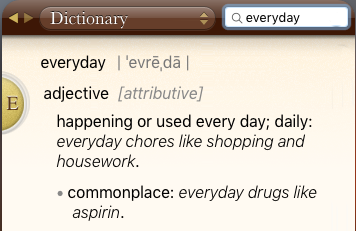 "Everyday" has its own entry in the dictionary because it's one word.
"Everyday" has its own entry in the dictionary because it's one word.Every Day (Two Words)
Every day is the form used for all other purposes. It will often be an adverbial phrase, but it can be other things as well. Adverbs modify verbs, adjectives, and other adverbs. This phrase typically modifies verbs.
Seth eats breakfast at 8:00 every day.
Every day is telling us more about the verb eats. It tells us when Seth eats. (Psst! When is an adverb question.)
Every day, I read for at least five minutes.
Every day is telling us about the verb read. It tells us when I read.
 "Every day" does not have its own dictionary entry because it's two words. The image above is in my dictionary as a note under the entry for "everyday."
"Every day" does not have its own dictionary entry because it's two words. The image above is in my dictionary as a note under the entry for "everyday."Tip
If you can substitute each day for the word in question, use every day.
It's Time For A Quiz
Are you ready to put your new knowledge to the test?
Check out the following five pictures and decide which are correct and which are incorrect. You'll find the answers just below the pictures.
1.

2.
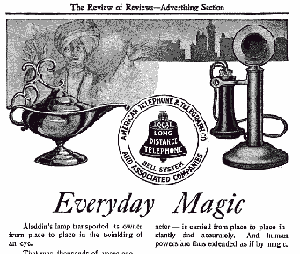
3.

4.

5.
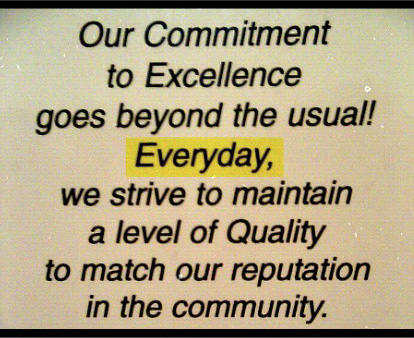
6.

Check Your Answers
Remember...
- Everyday is always an adjective.
- If you can substitute it for each day, use every day.
1. Keep calm and smile everyday. --> Incorrect
Here, everyday is modifying smile.
Since smile is a verb, they should have used the
adverbial phrase every day.

2. Everyday Magic --> Correct
This
is an old telephone ad from the 1920s. Isn't it fun to see how much
marketing has changed since then? These guys got their ad copy right
when they chose everyday. It is modifying
magic, which is a noun.
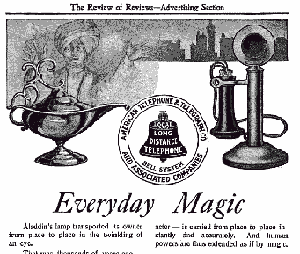
3. Start every day off with a smile and get it over with. --> Correct
We can easily substitute each day for every day, so this is correct.
Did
you notice that this isn't an adverbial phrase? Every is just a plain old adjective, and day is just a plain old noun. (For those of you
grammar buffs, day is the direct object of the verb start.)

4. Learn everyday. --> Incorrect
Everyday is modifying learn.
Learn is a verb, so it needs to be modified by an adverb or an adverbial phrase, not an adjective.

5. Our commitment to excellence goes beyond the usual! Everyday, we strive to maintain a level of quality to match our reputation in the community. --> Incorrect
I took the liberty of correcting the wonky capitalization in that sentence.
Everyday is telling us more about the verb strive, so they should have used the adverbial phrase every day.
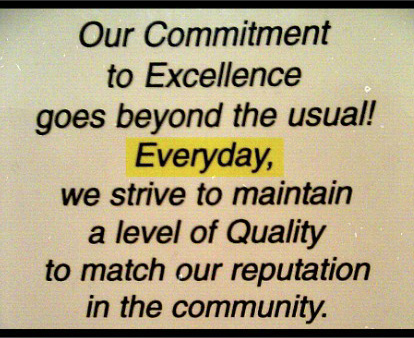
6. Find joy in every day. --> Correct
We can easily substitute each day for every day, so this is correct.
Here, in every day is a prepositional phrase.
In is the preposition, day is the object of the preposition, and every is an adjective.

I hope that this lesson will help you avoid making the everyday/ every day grammar mistake in the future. Learn more about how to avoid mistakes like these by learning about the parts of speech, phrases, and clauses. I'll teach you everything you need to know in fun video lessons. Join us! Learn more here.

Hello! I'm Elizabeth O'Brien, and my goal is to get you jazzed about grammar.
I used your materials to get a teaching position, and I wouldn't have passed the grammar section without your lessons!
- Pearl, Teacher
This is original content from https://www.english-grammar-revolution.com/grammar-mistake.html
Our Free Guide Gives You A Fun Way
To Teach And Learn The Basics v

Elizabeth O'Brien is the creator of Grammar Revolution.
Her lessons are guaranteed to give you more confidence in your communication skills and make you smile. :)

